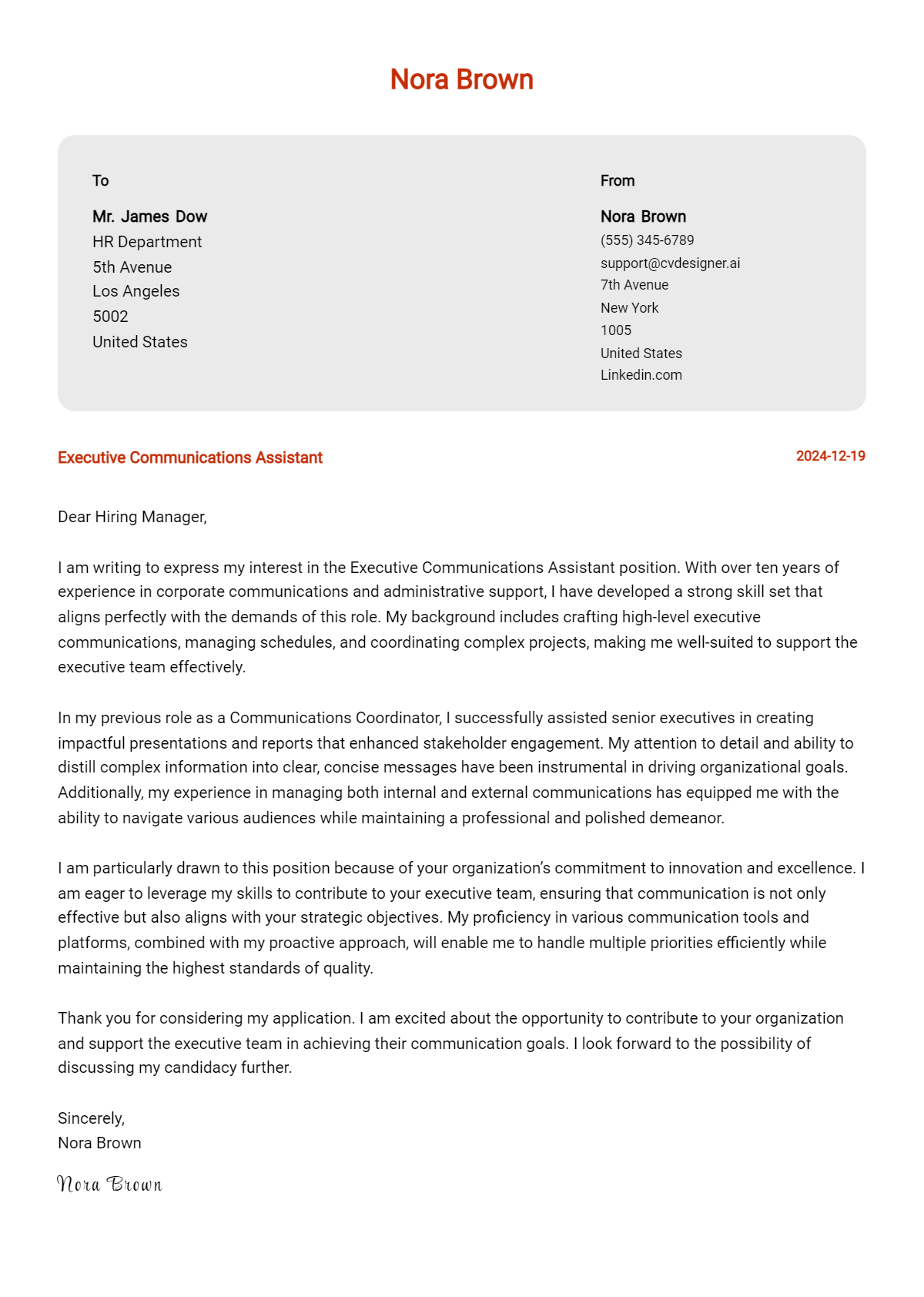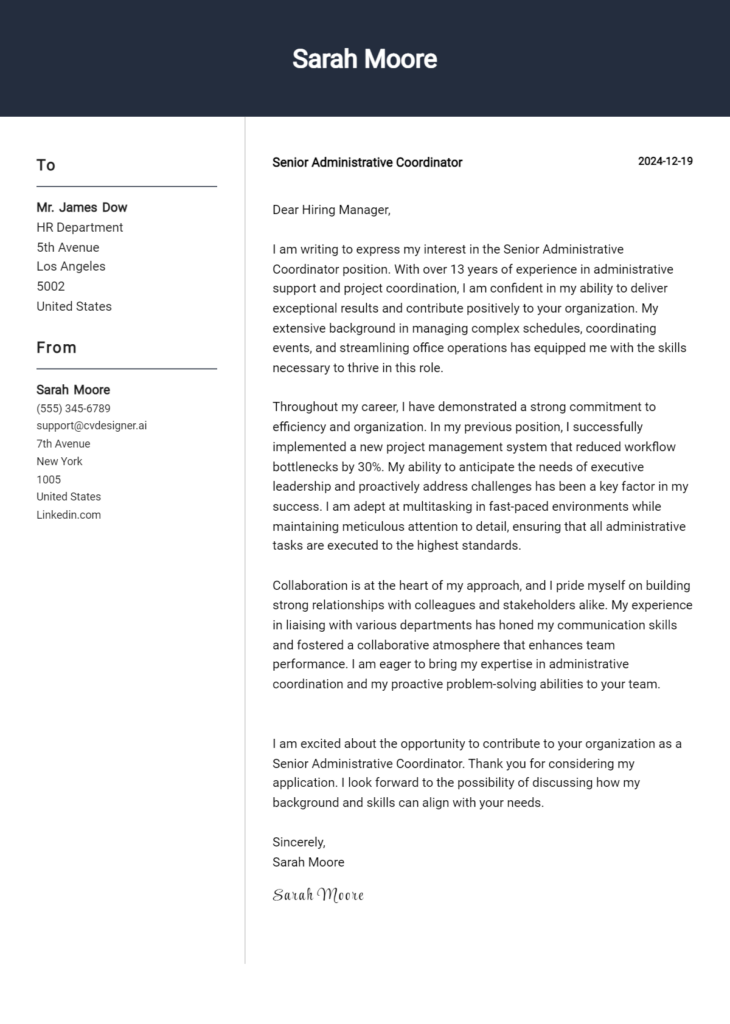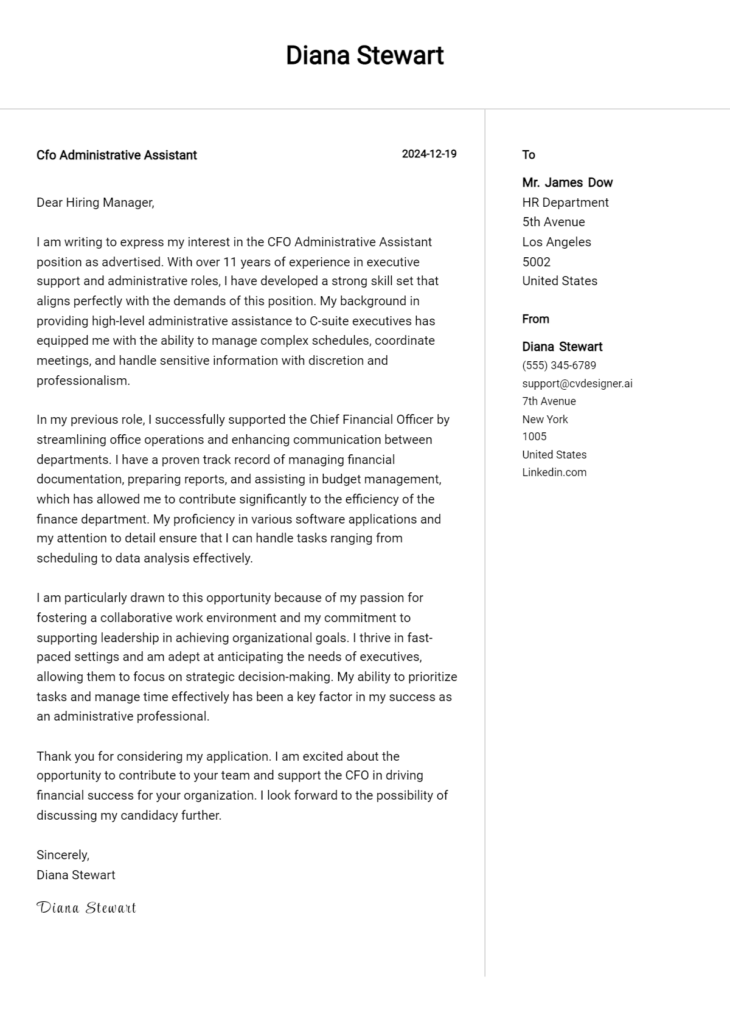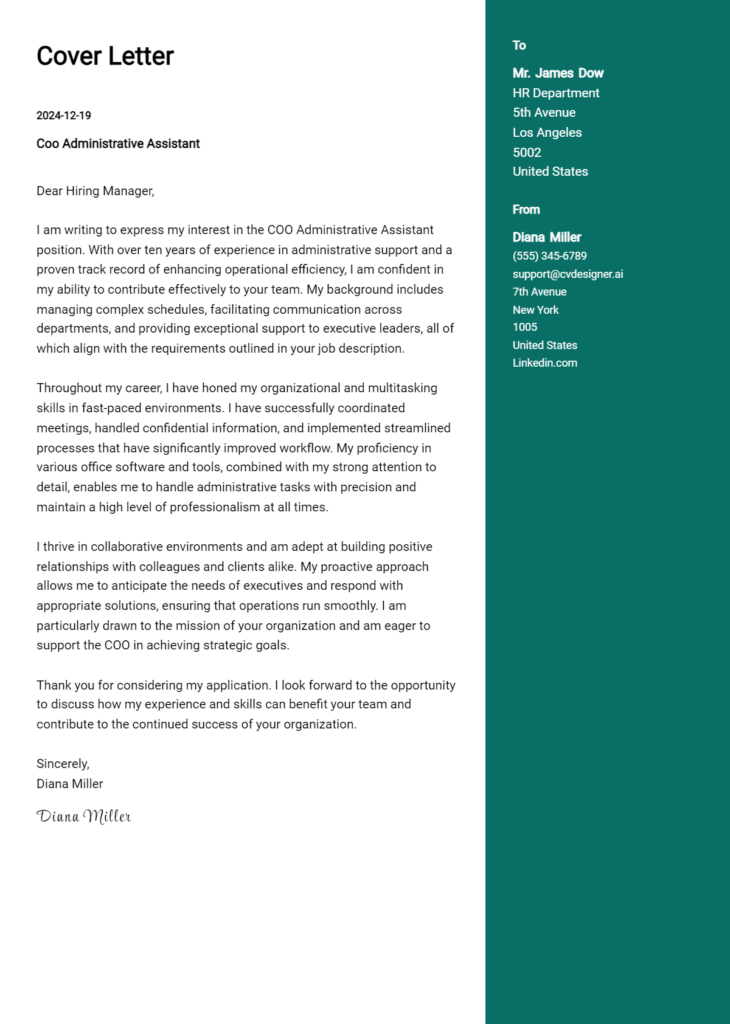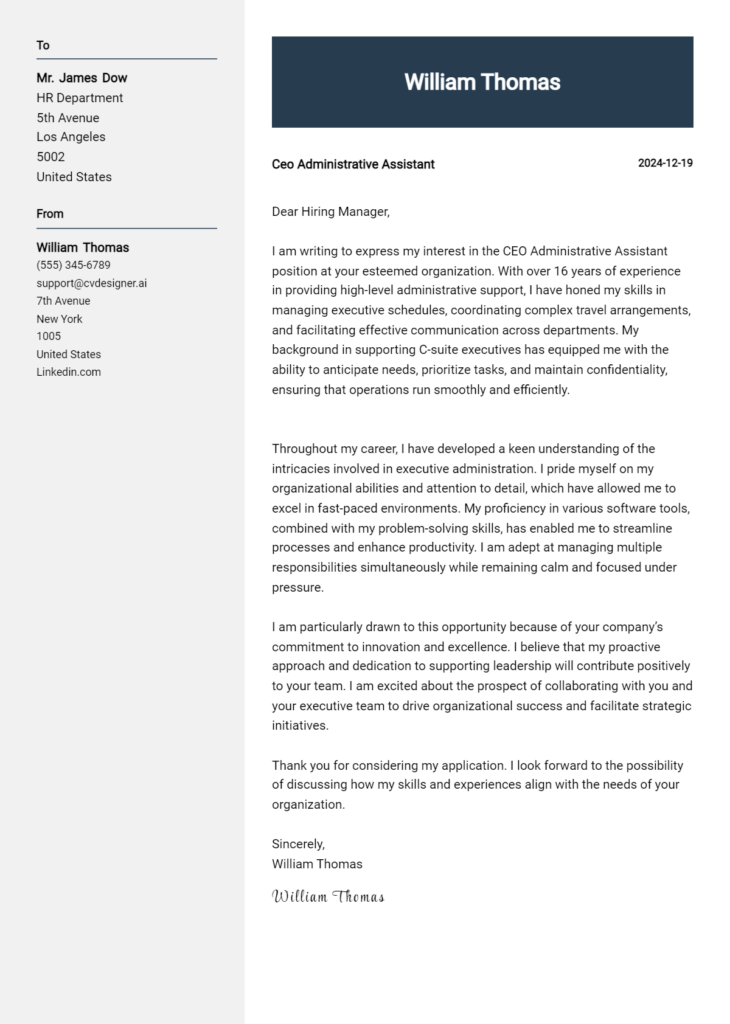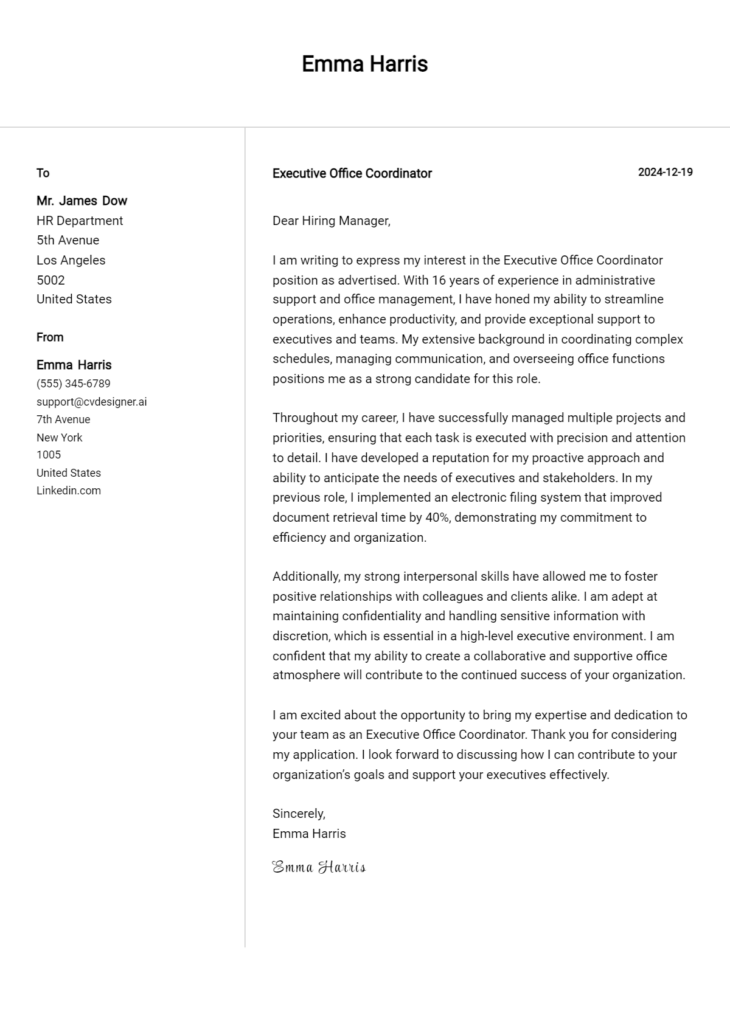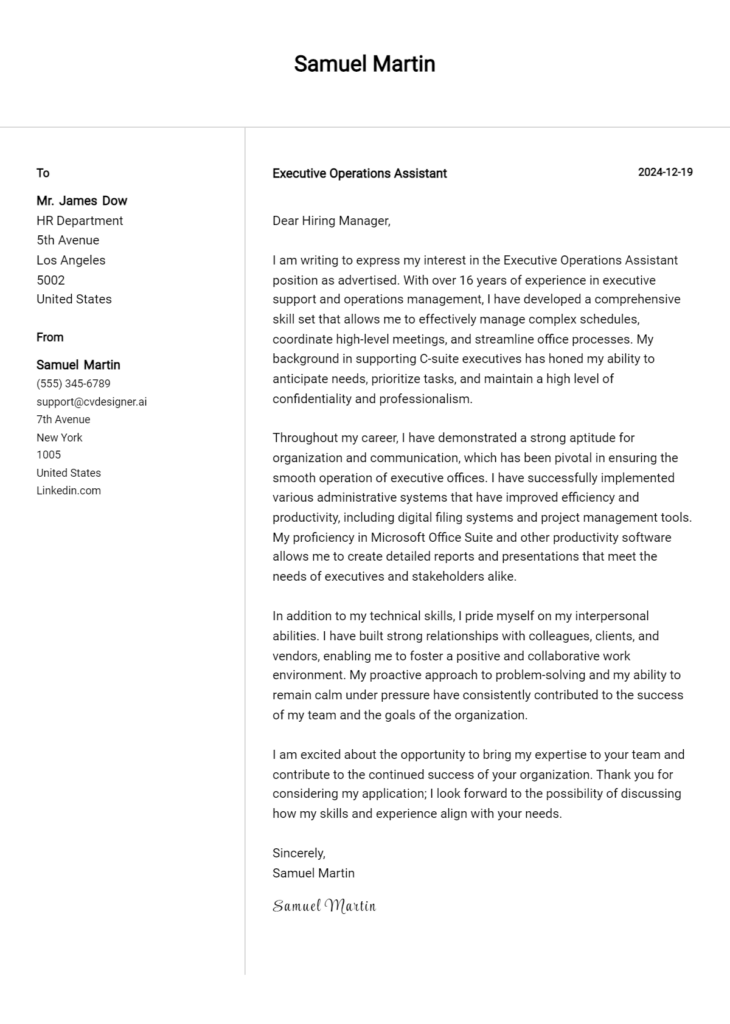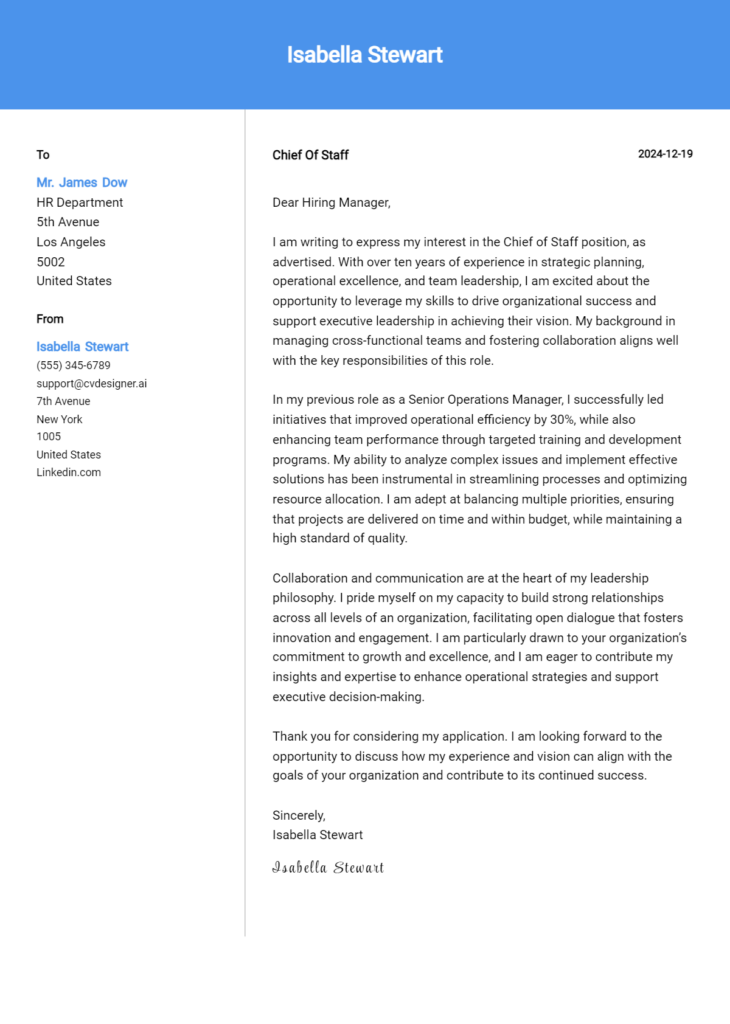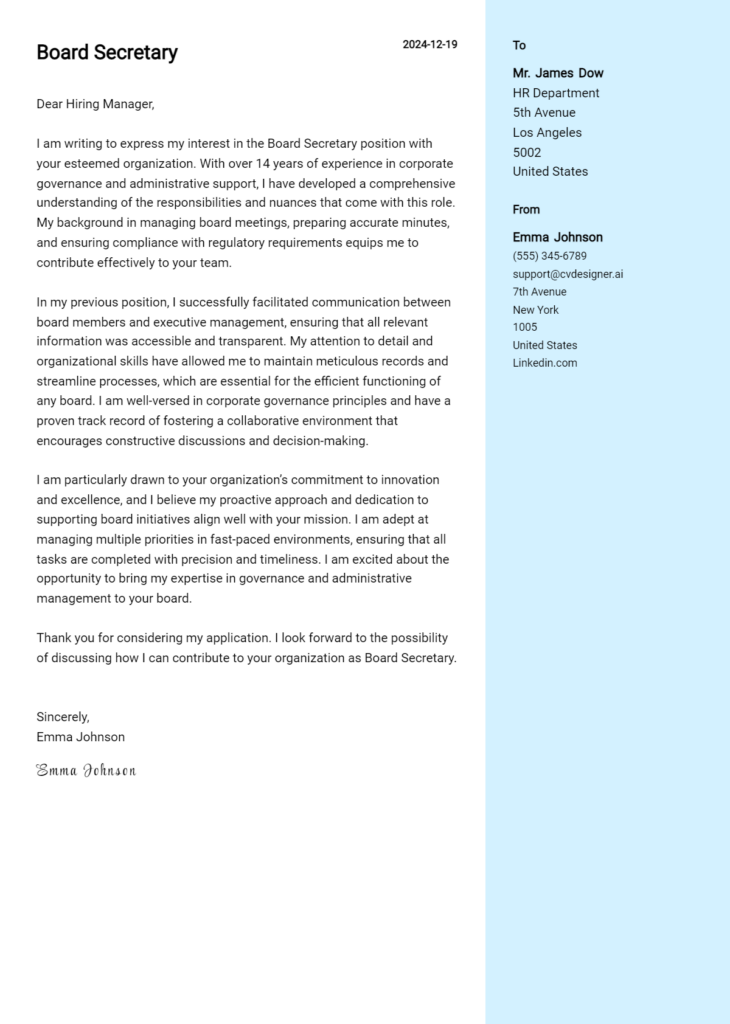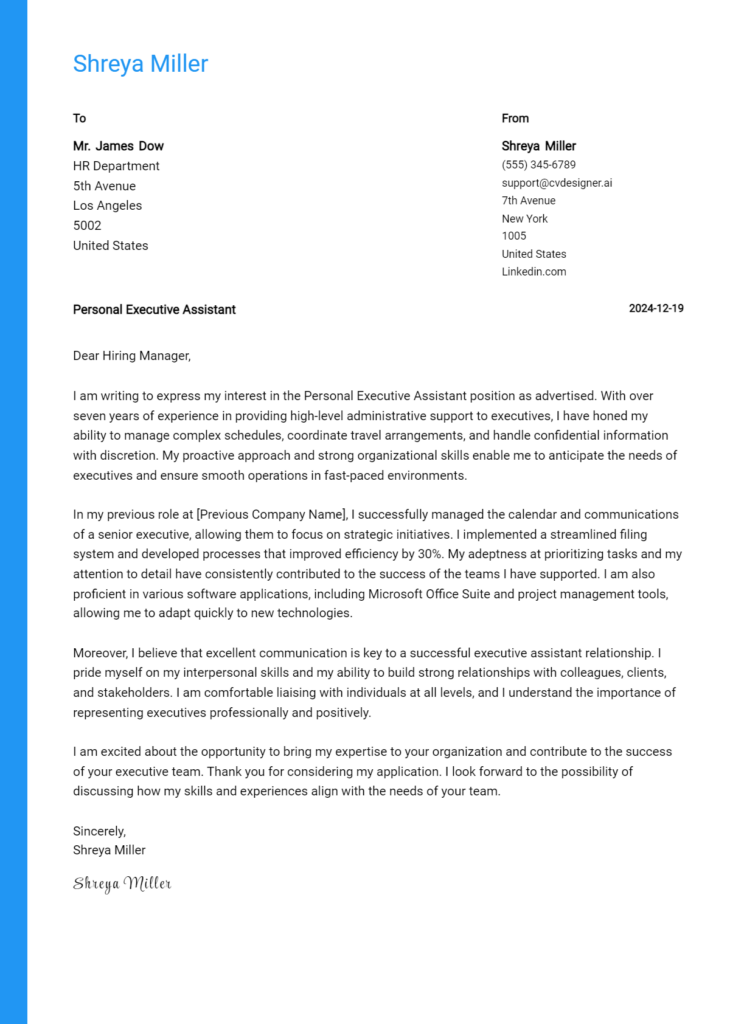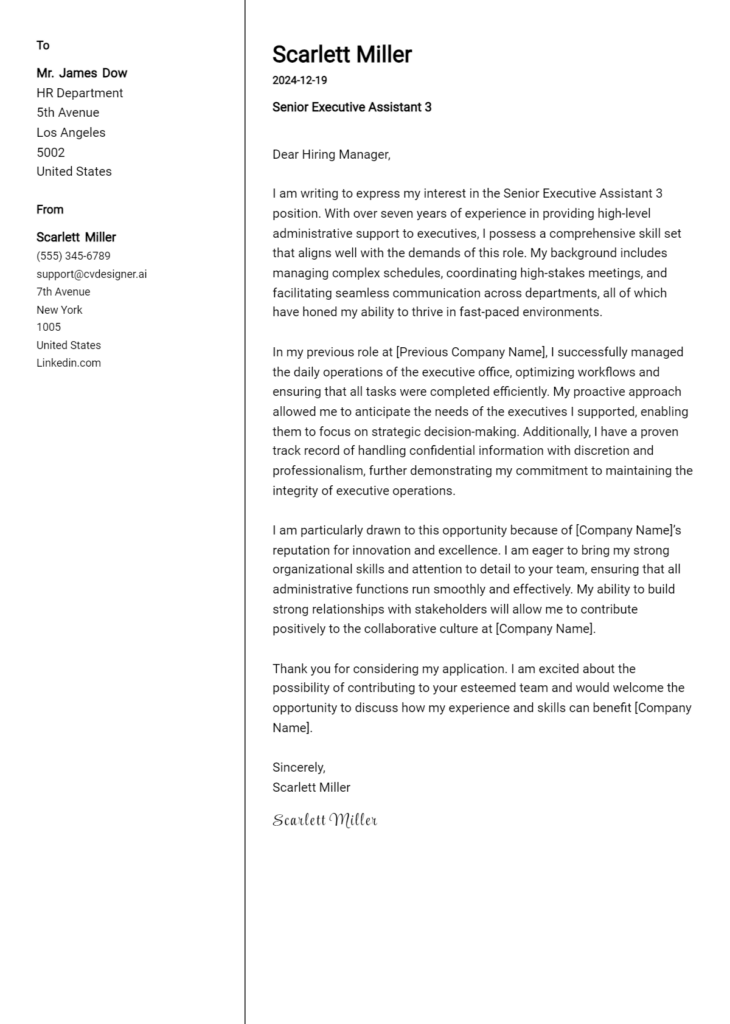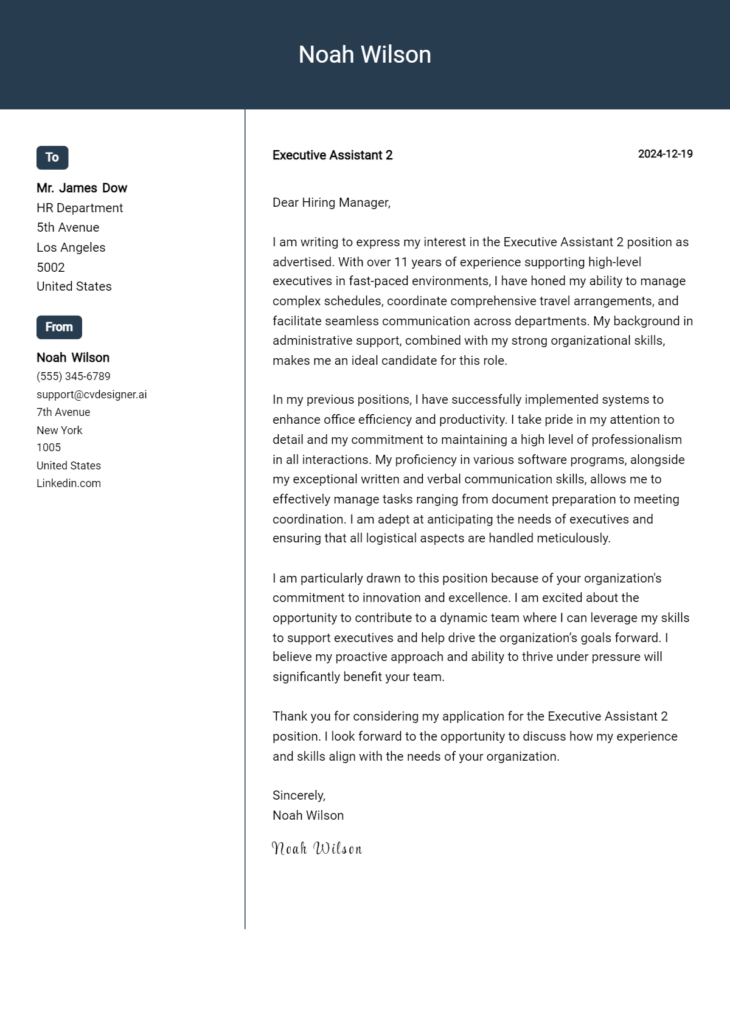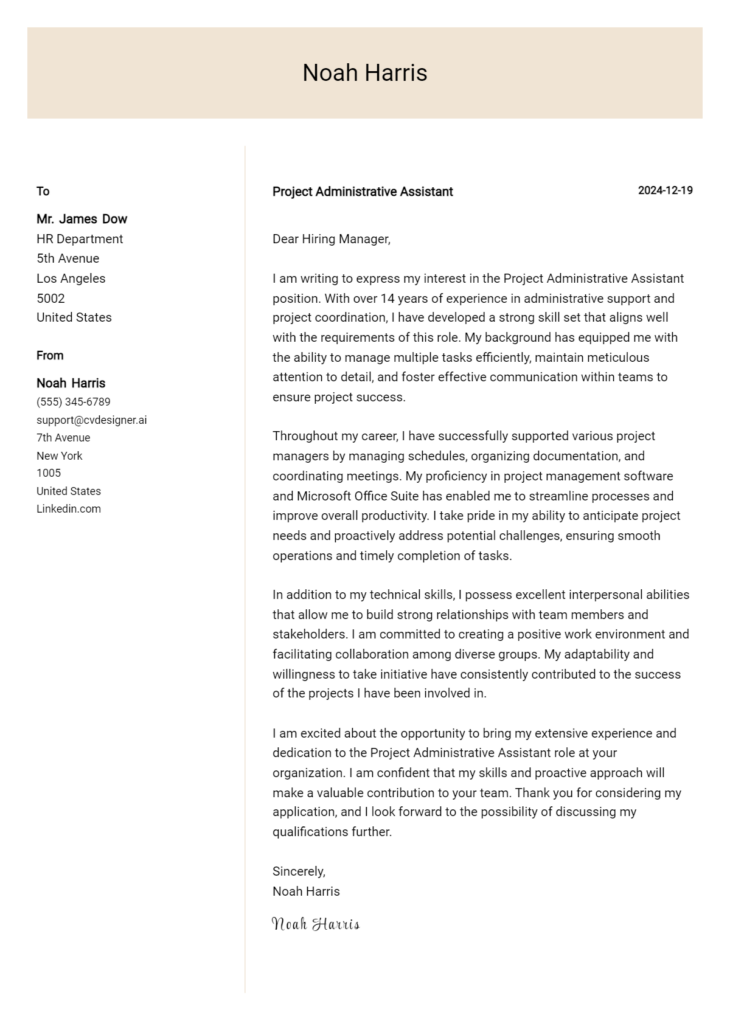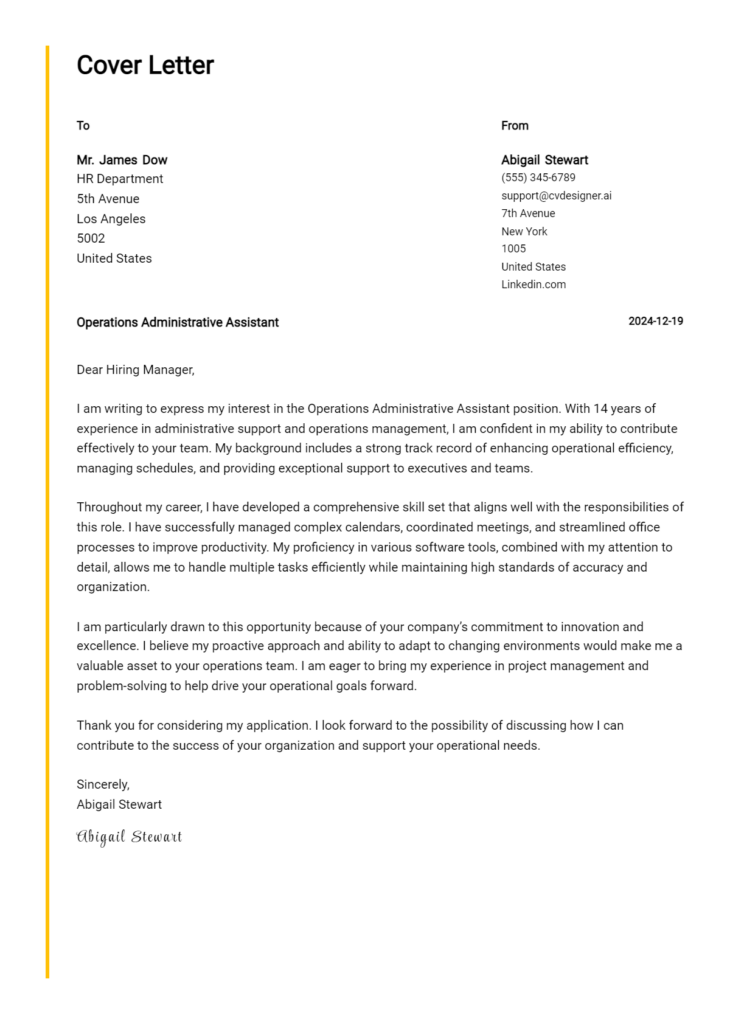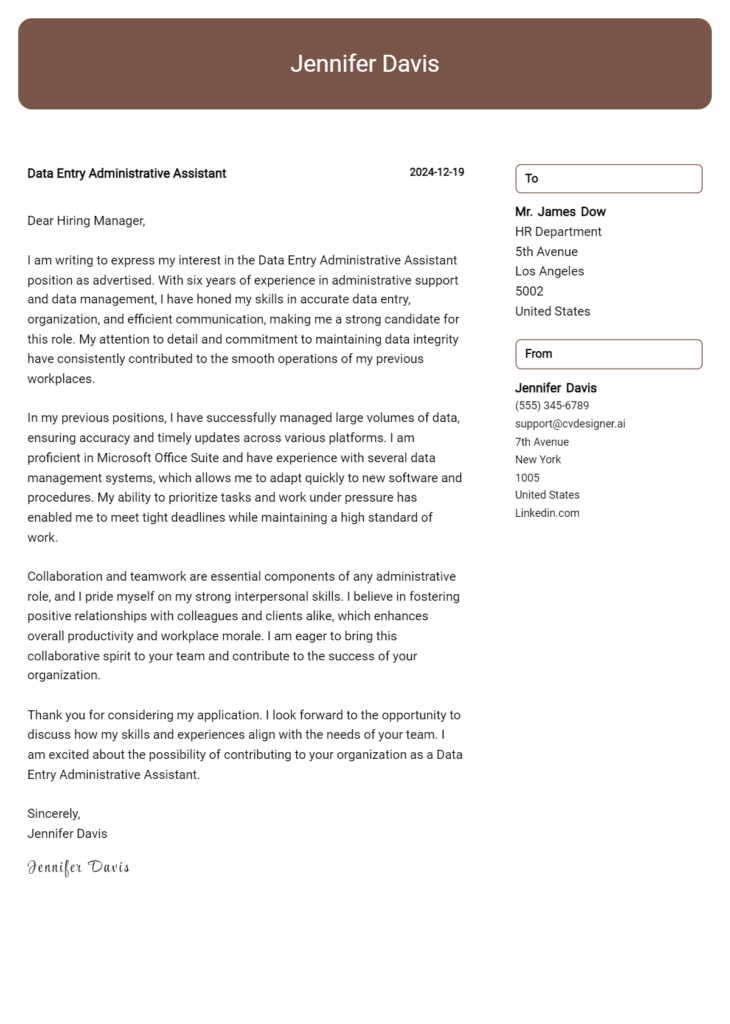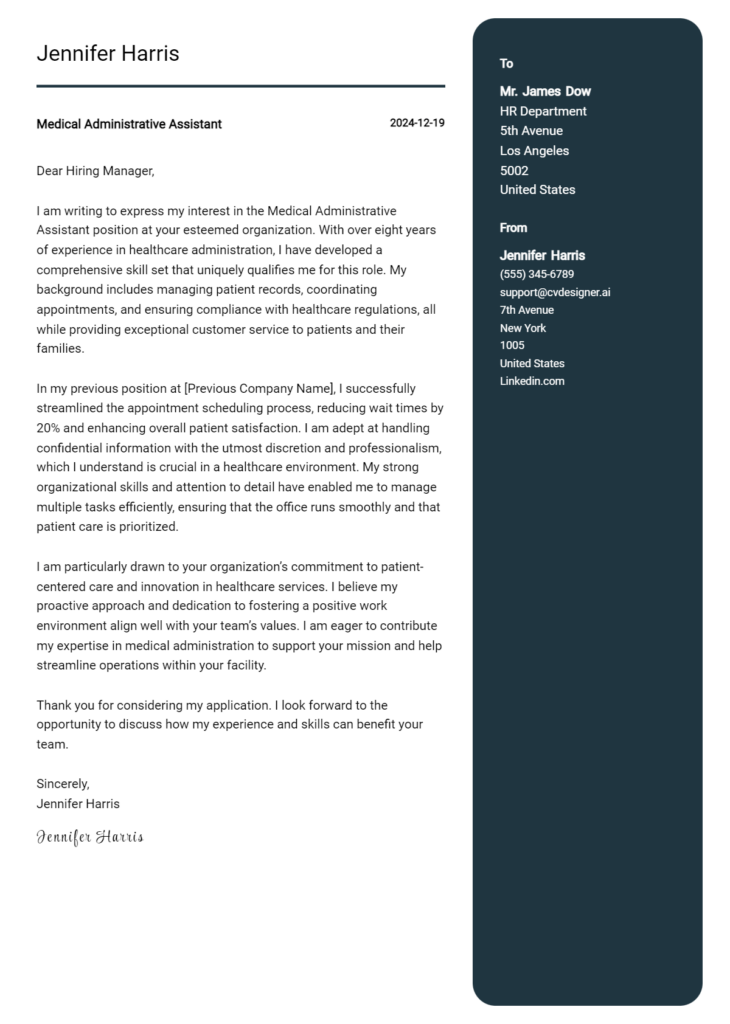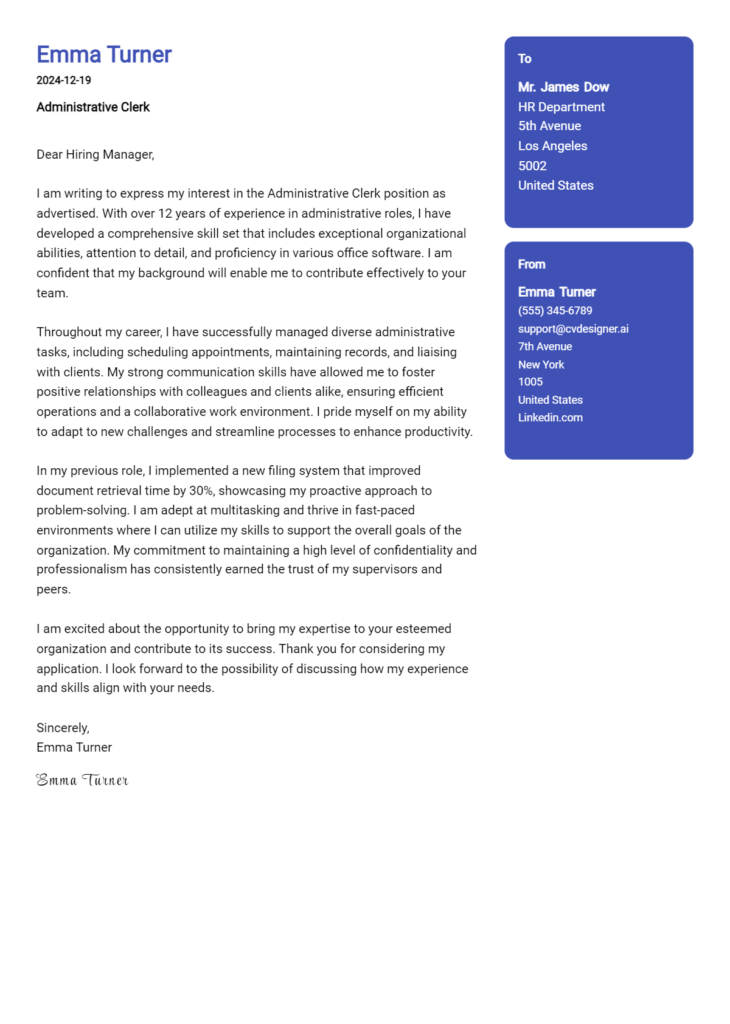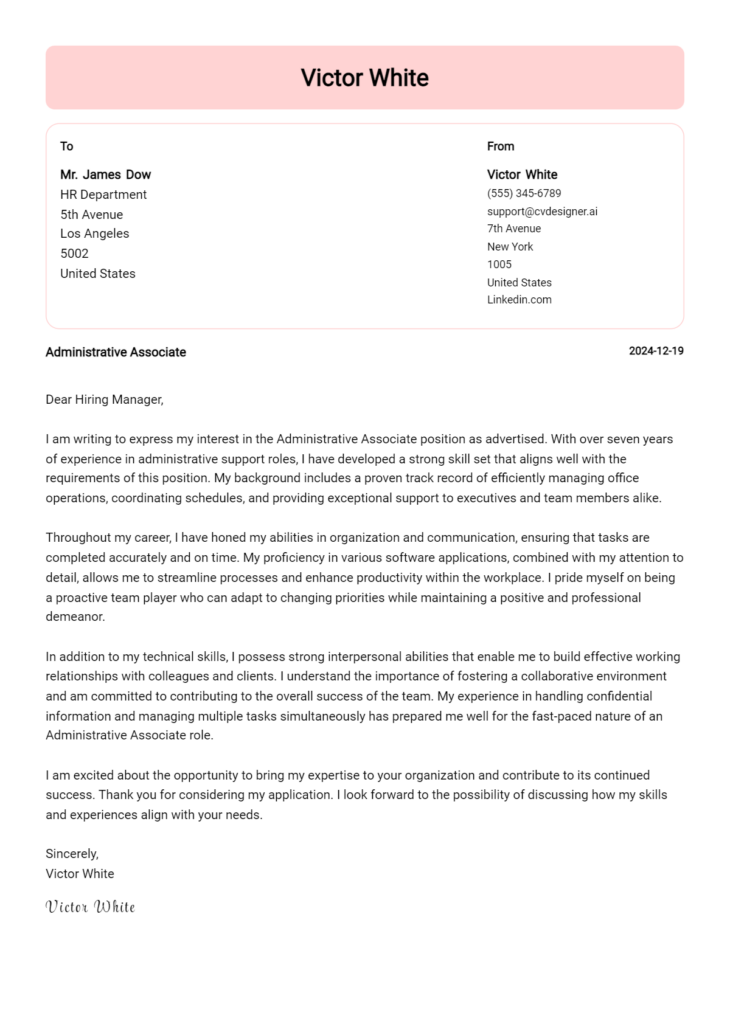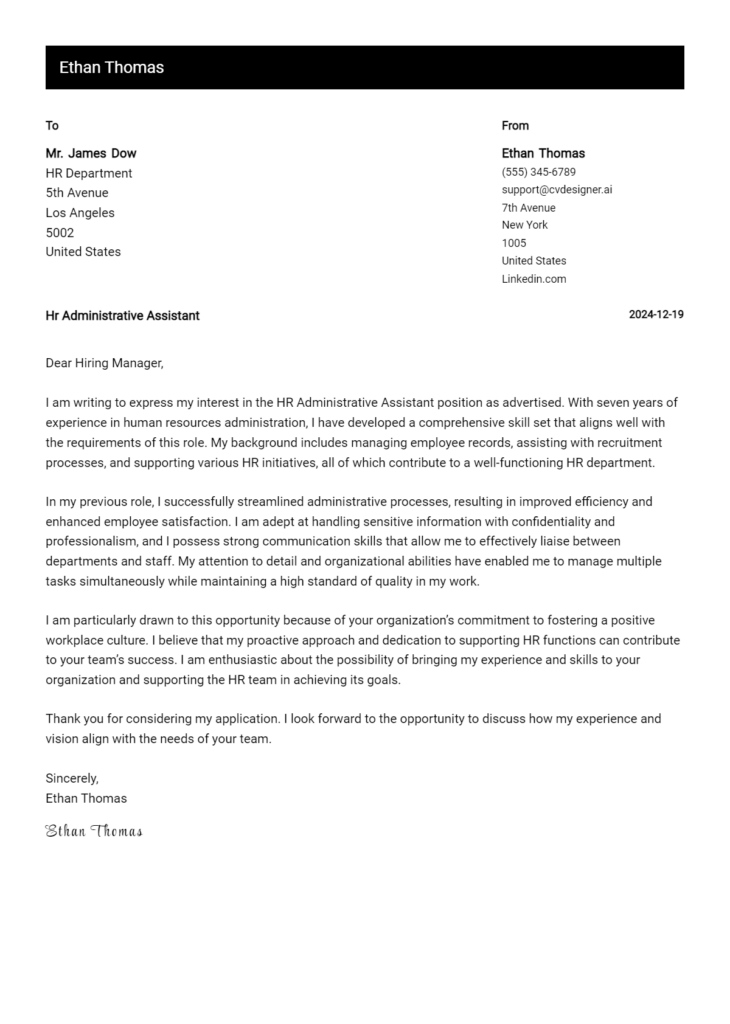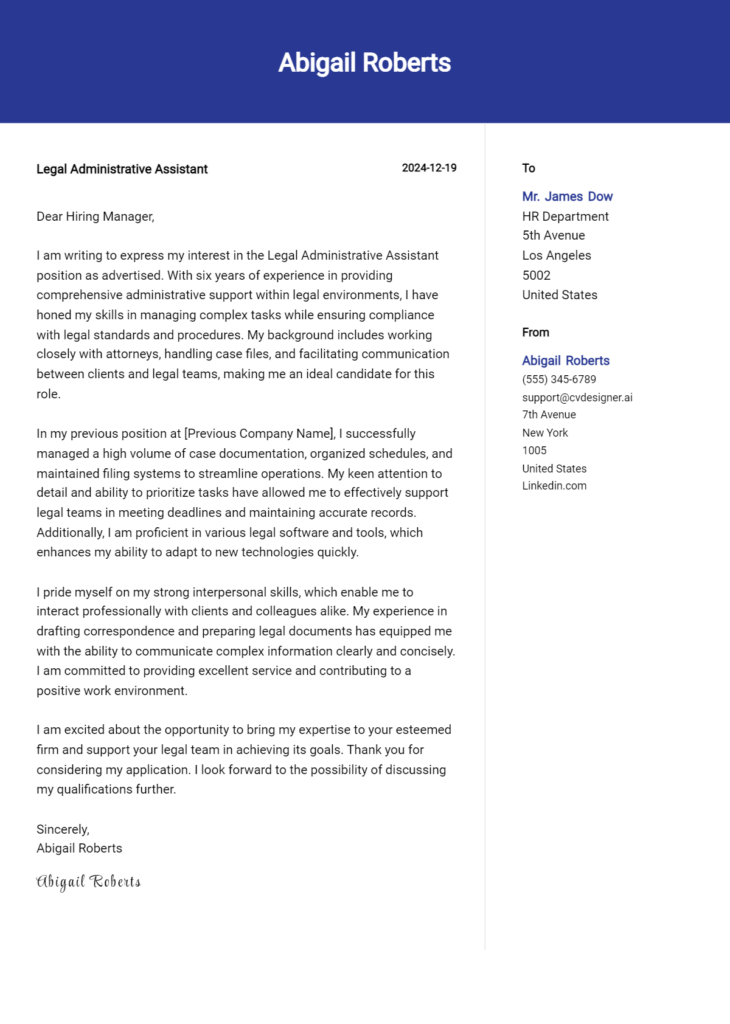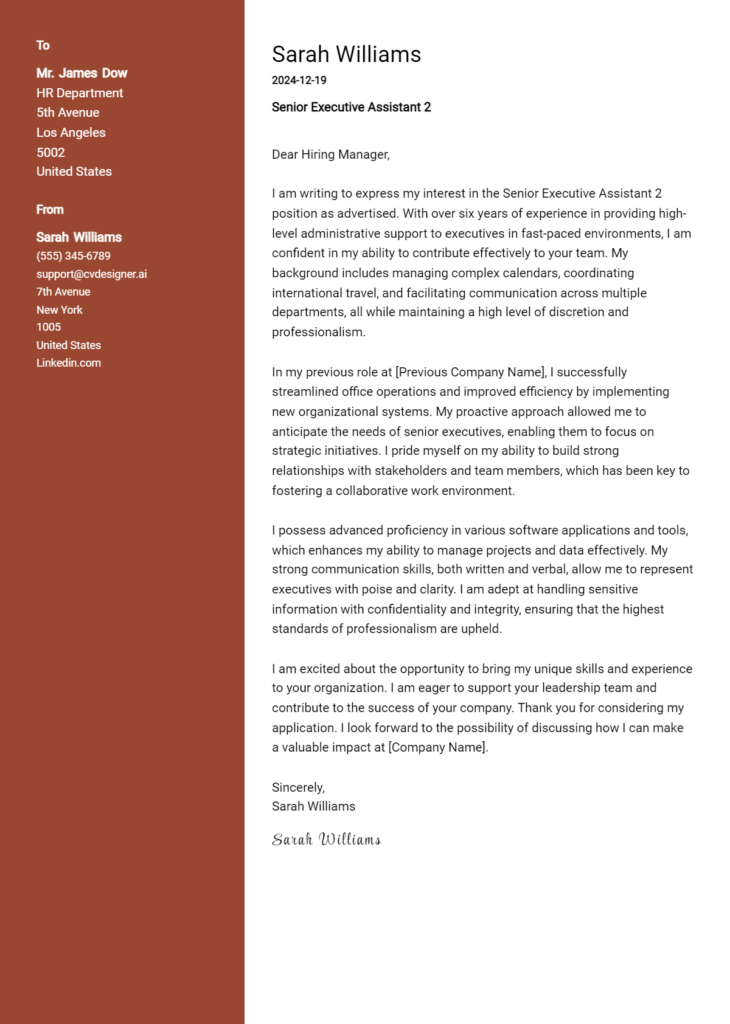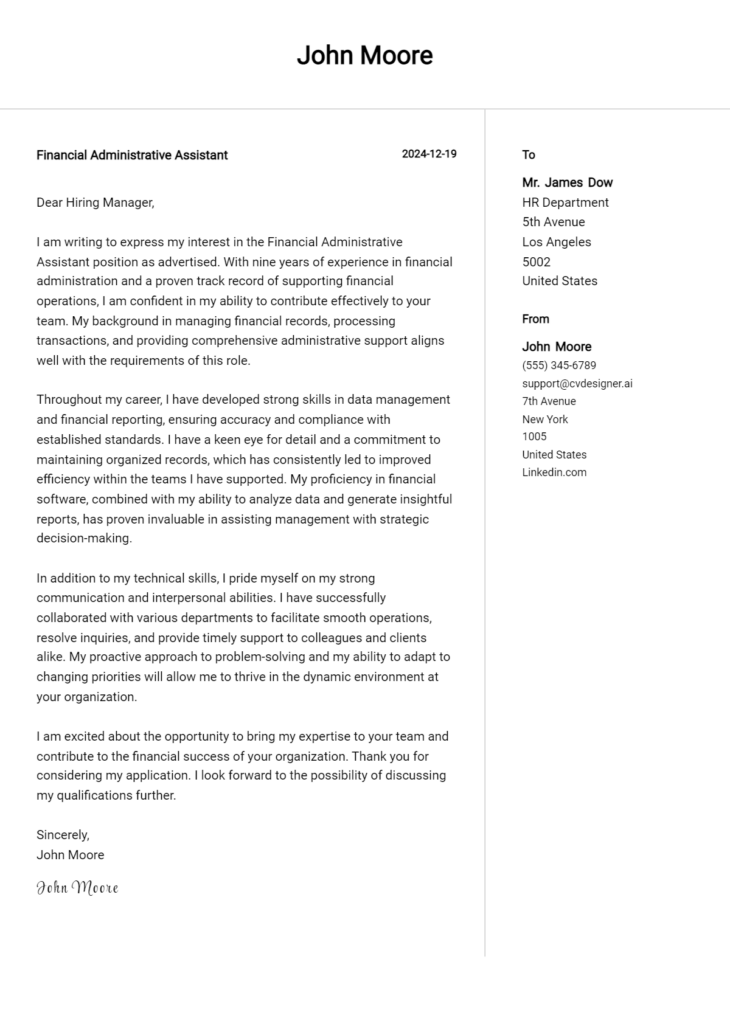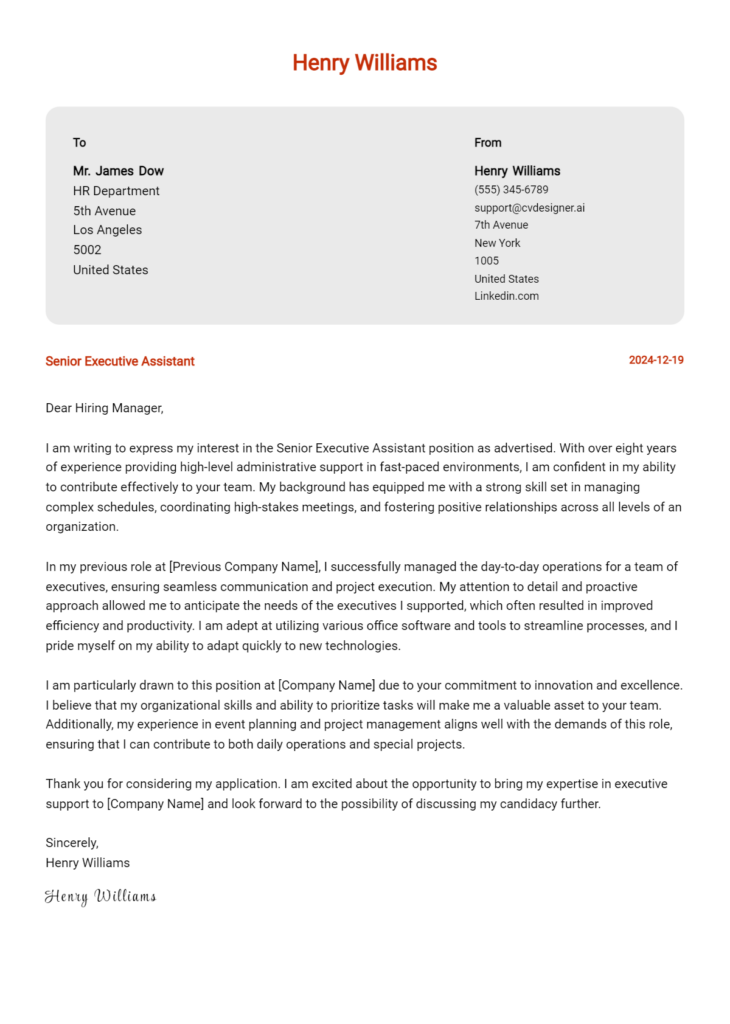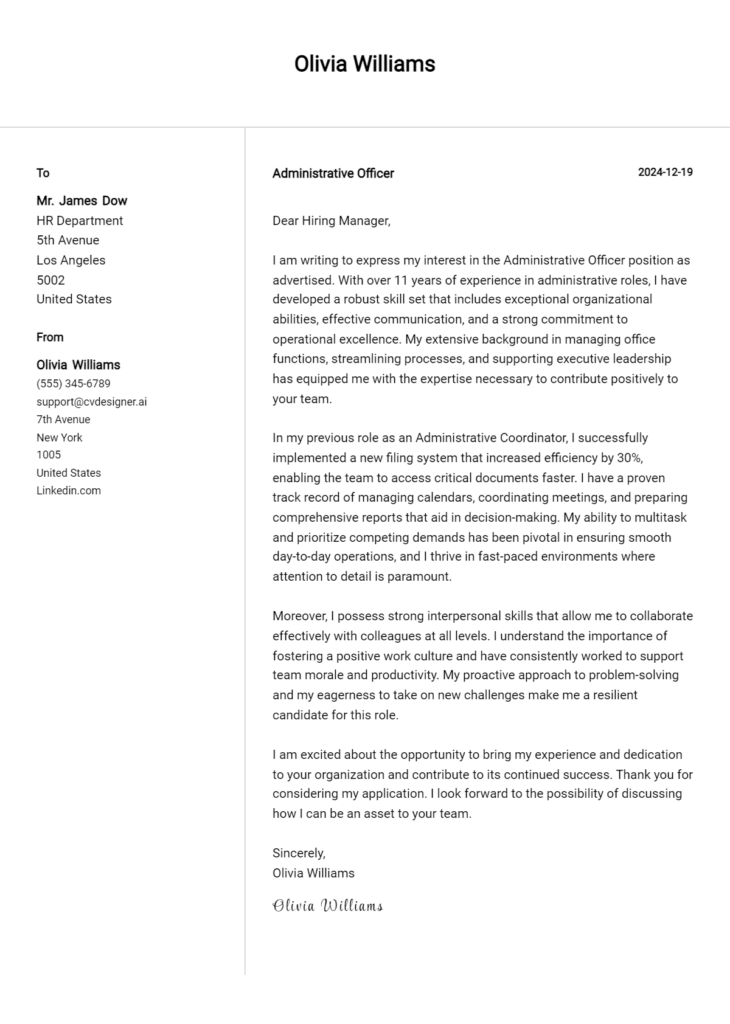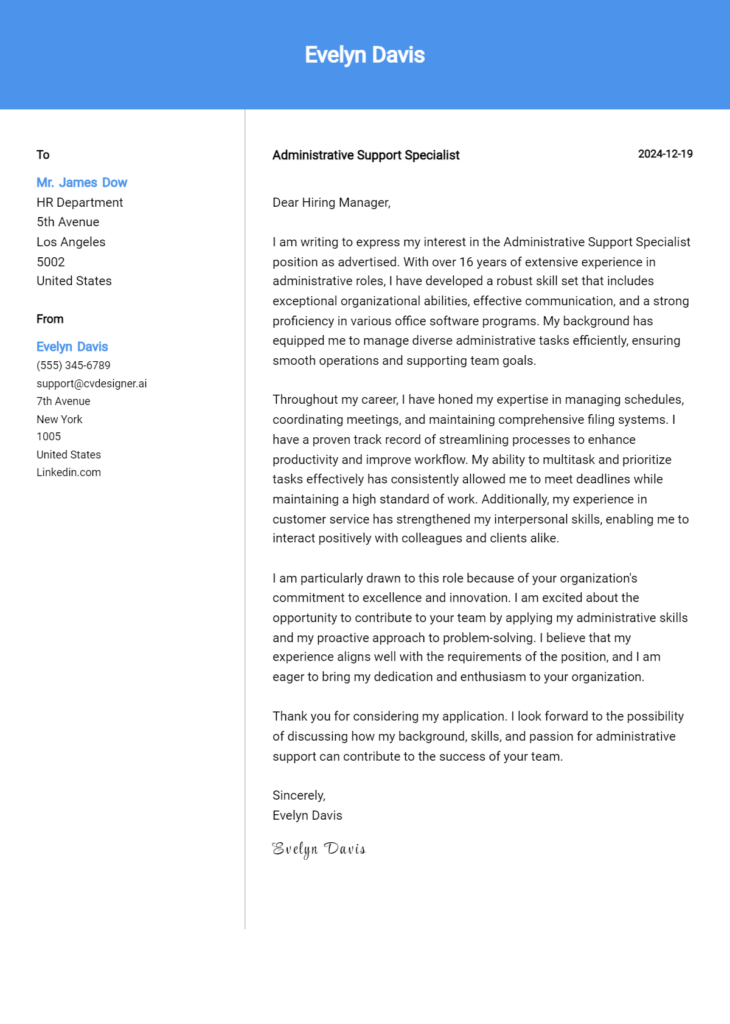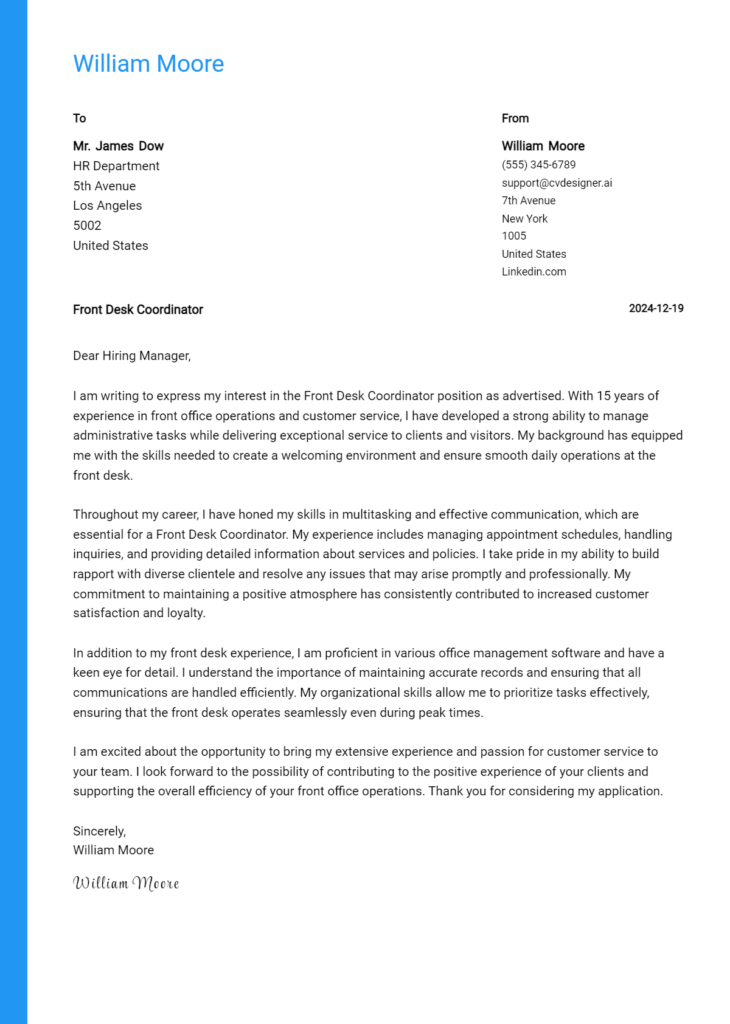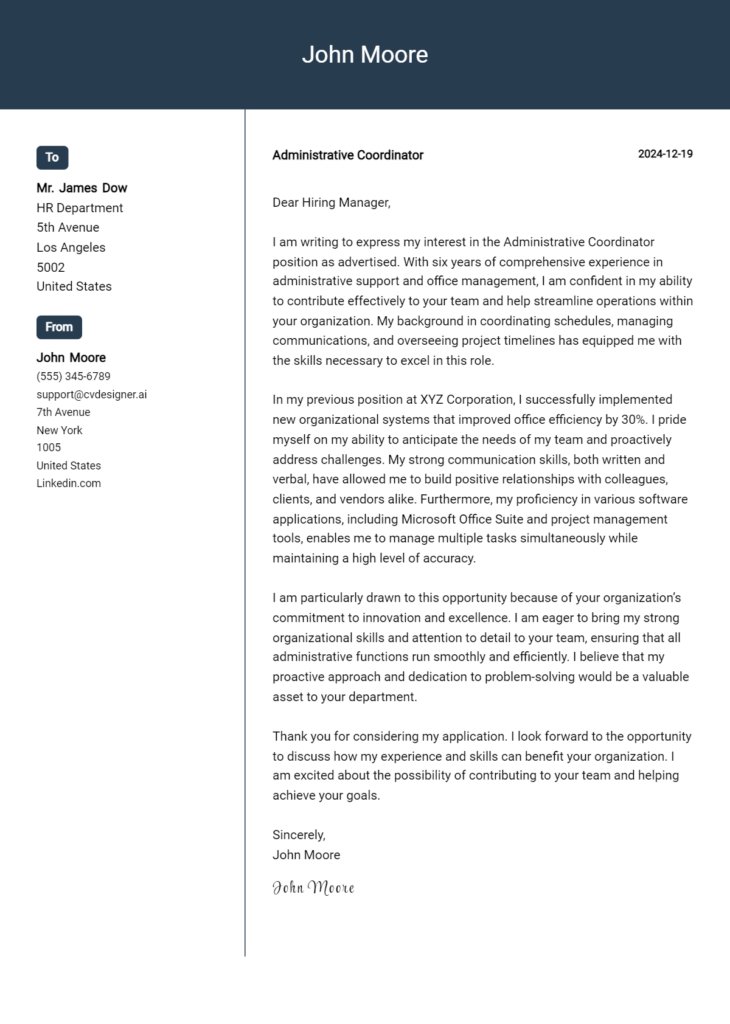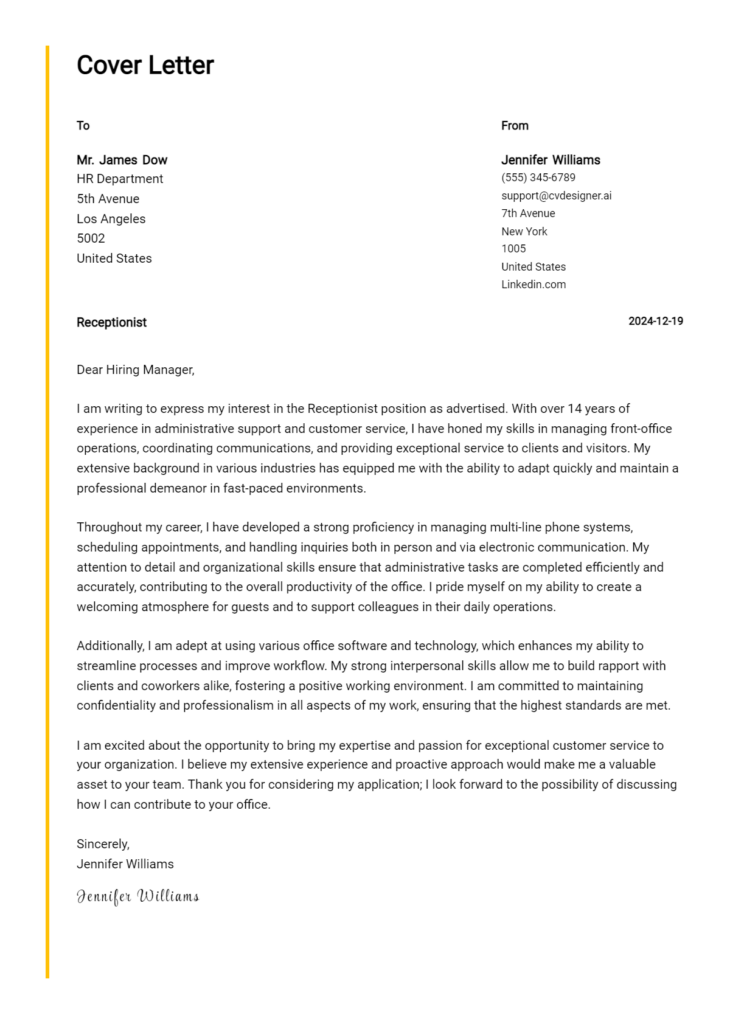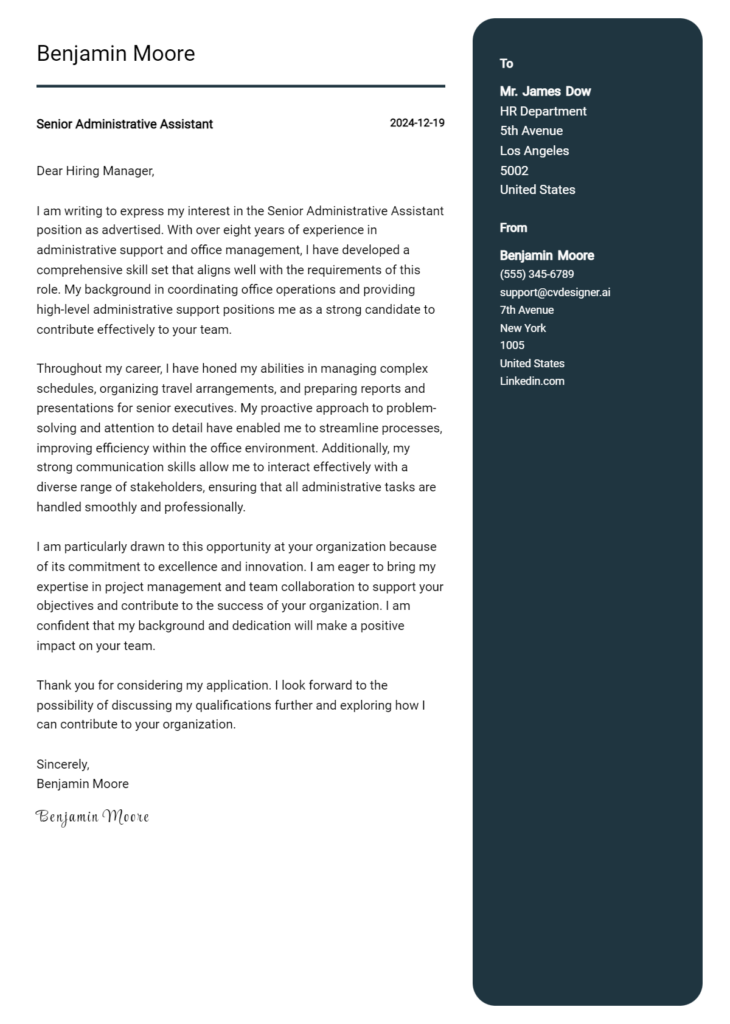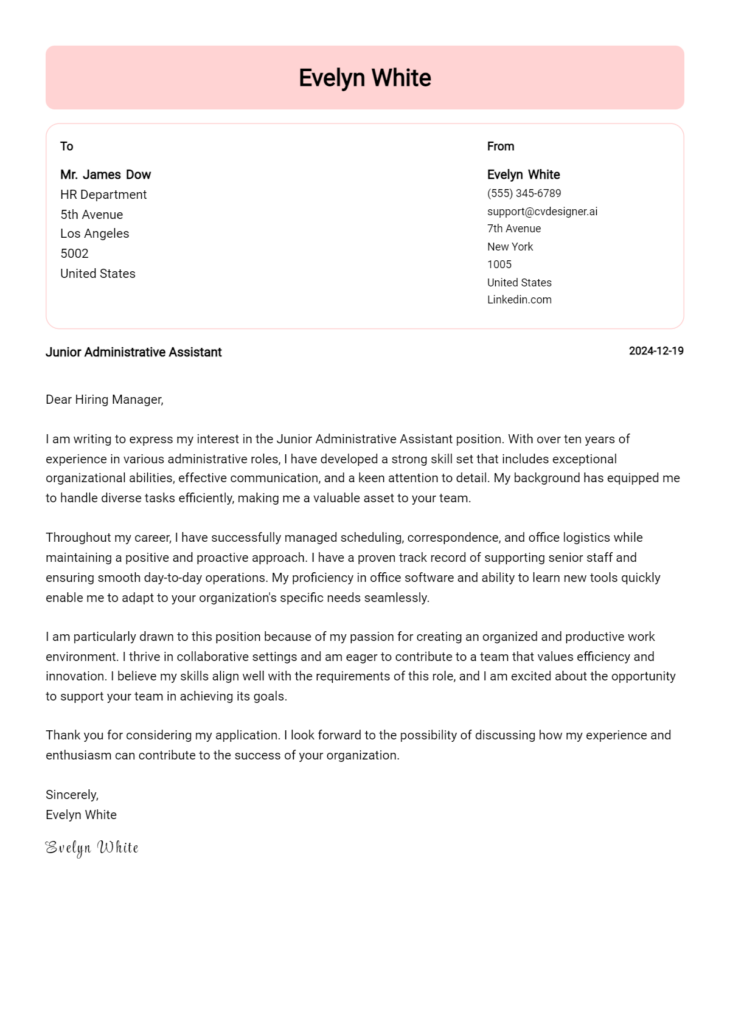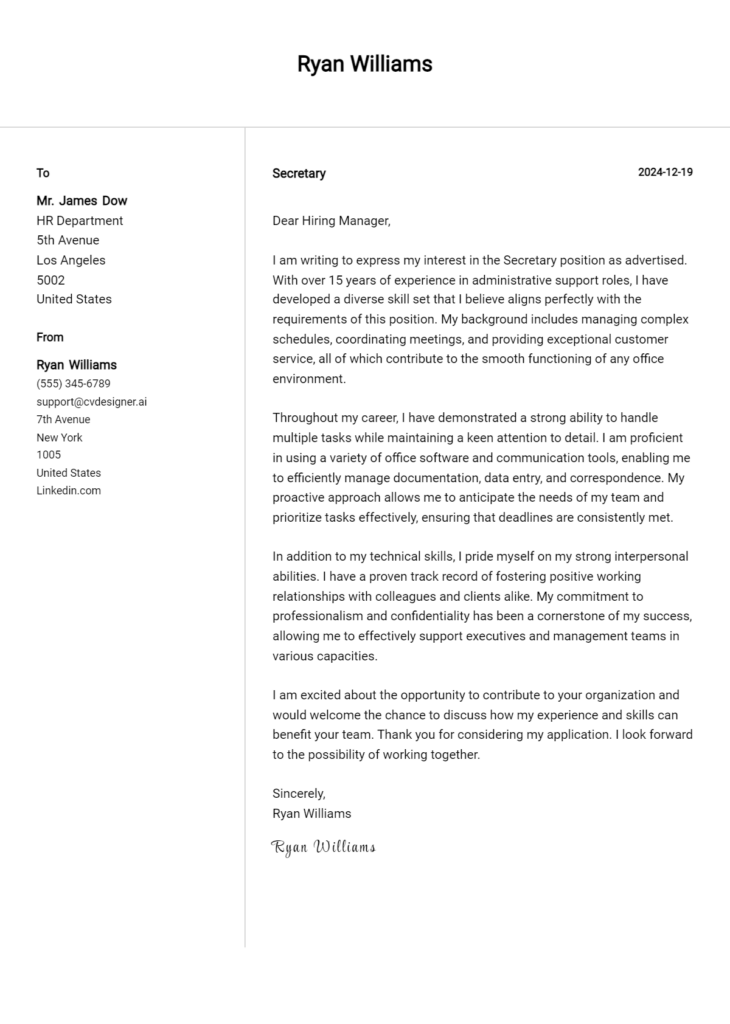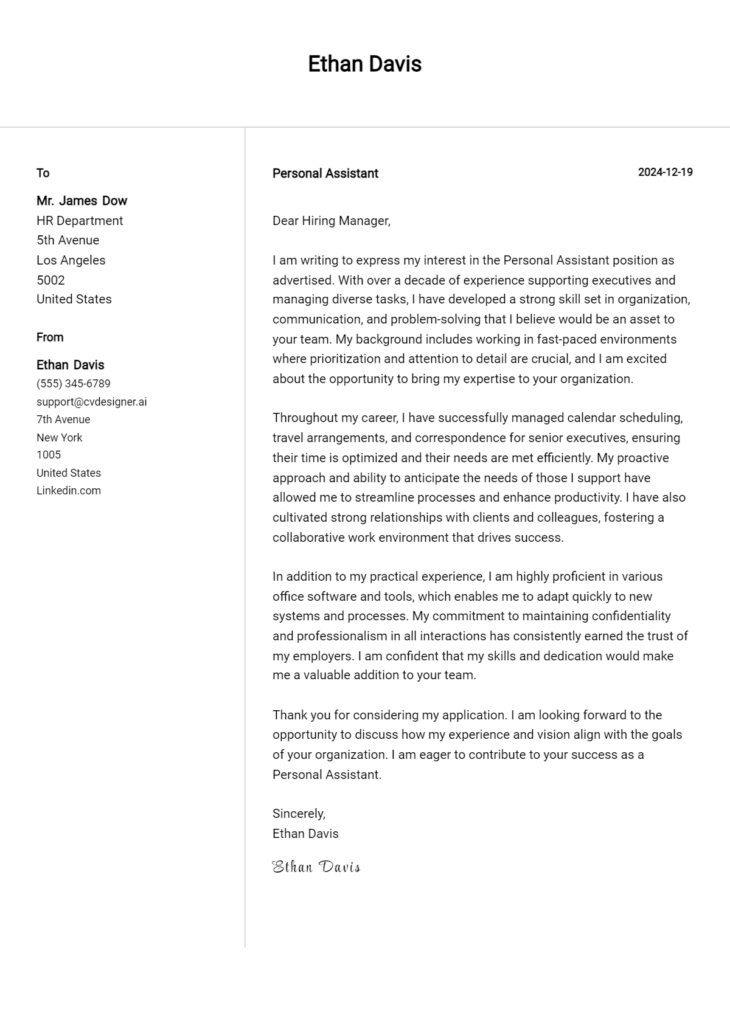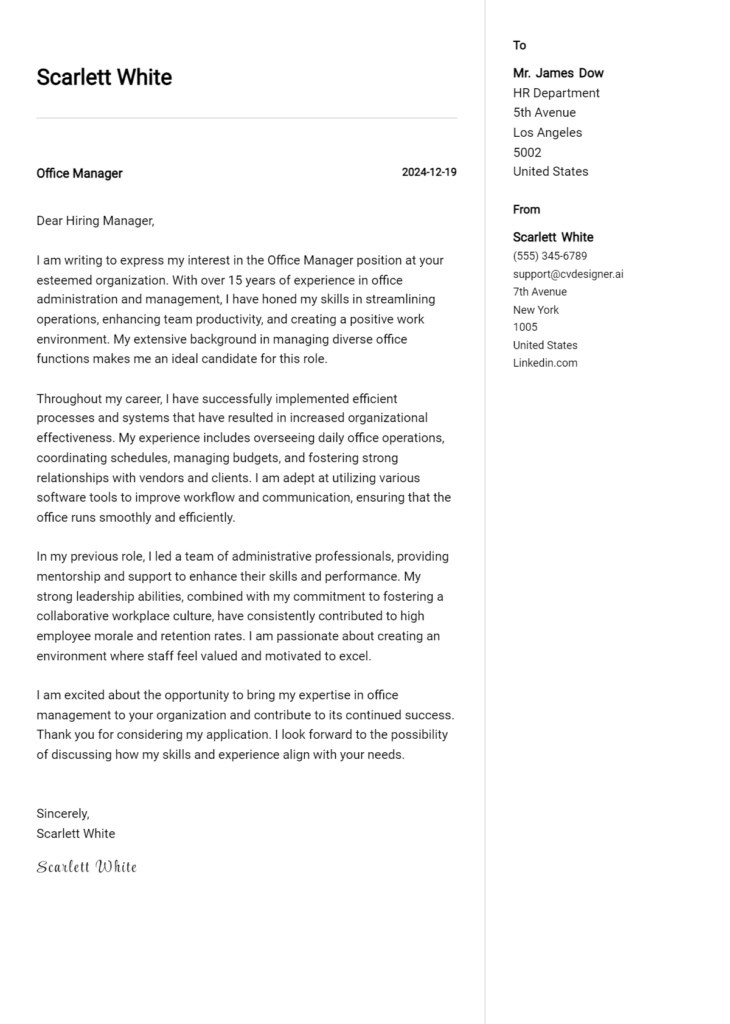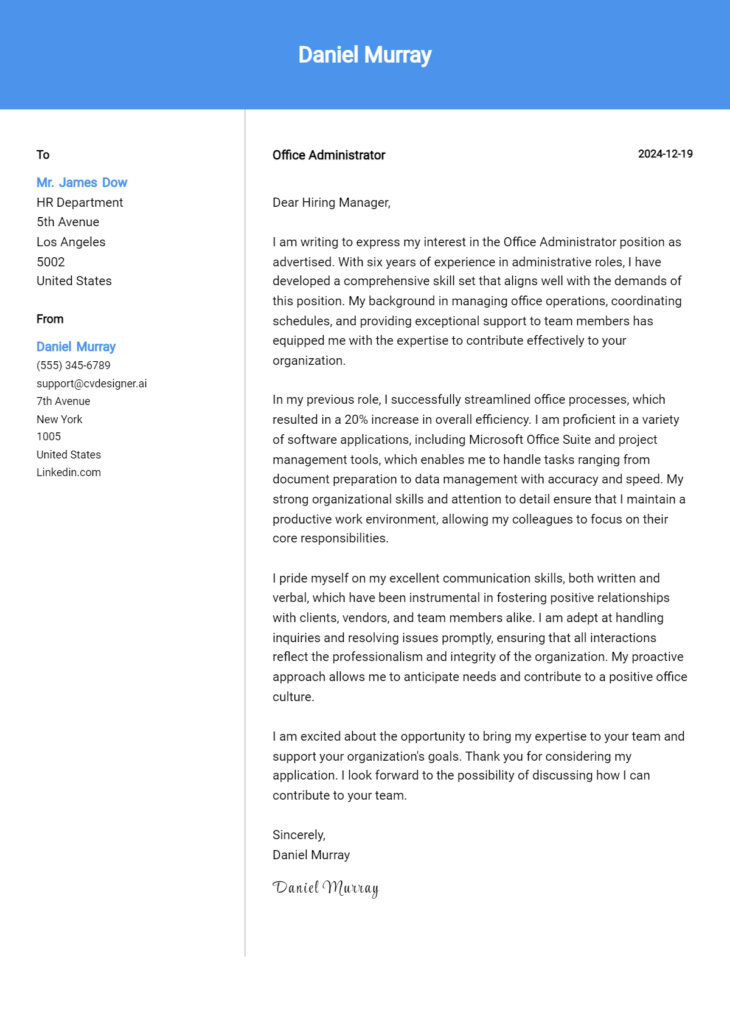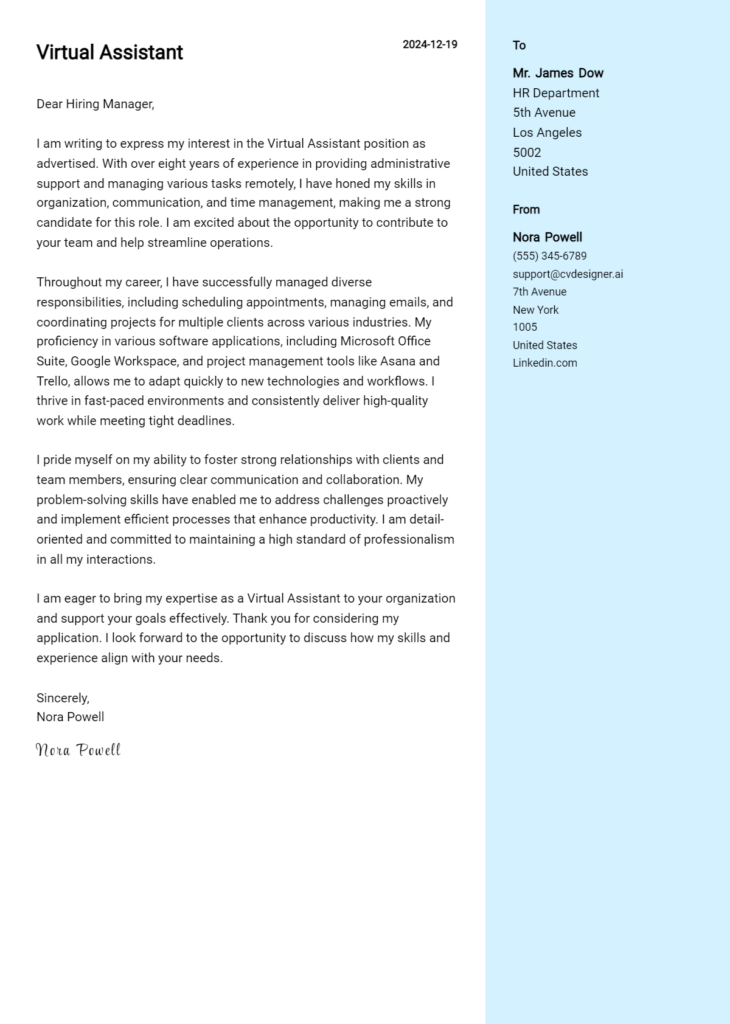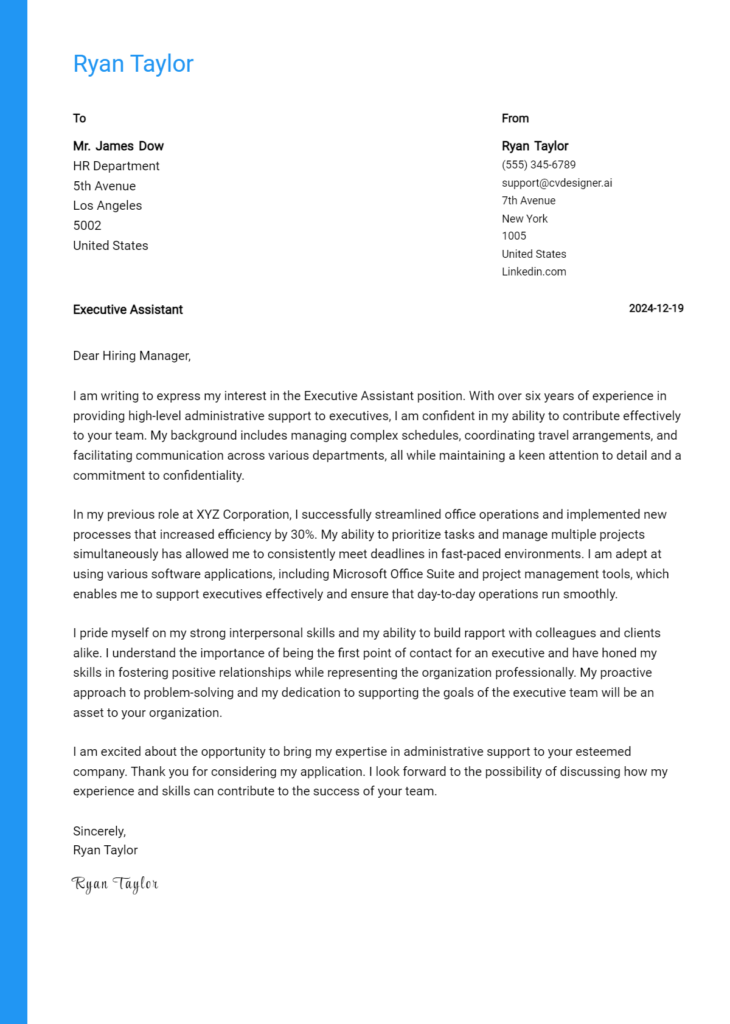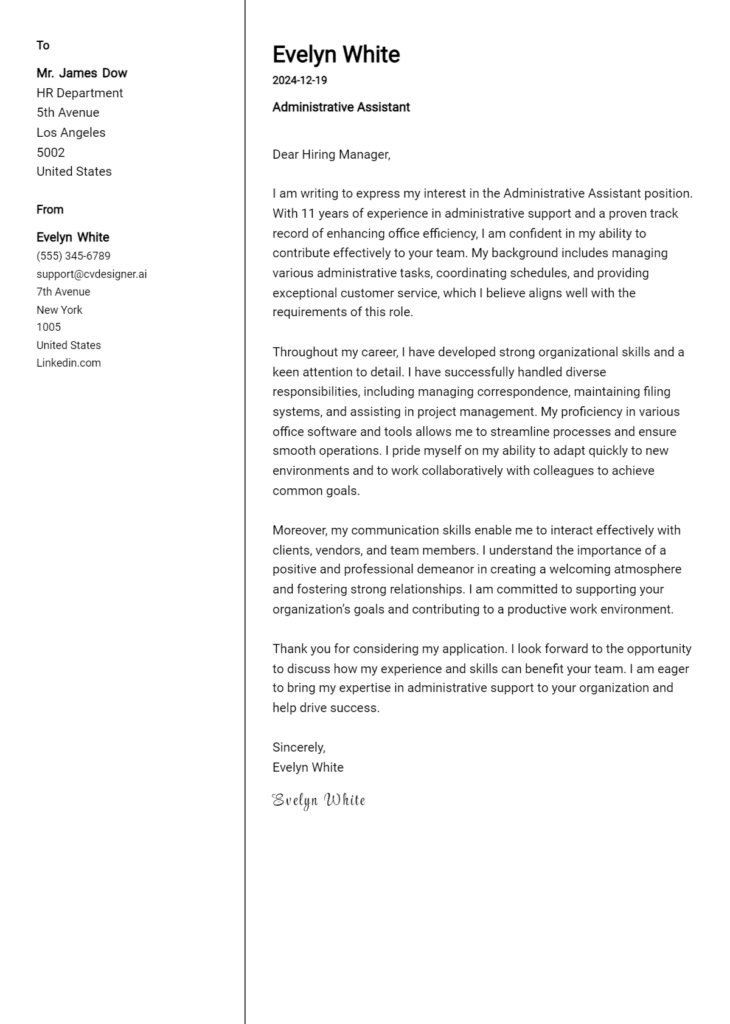Executive Communications Assistant Cover Letter Examples
Explore additional Executive Communications Assistant cover letter samples and guides and see what works for your level of experience or role.
How to Format an Executive Communications Assistant Cover Letter
Crafting a compelling cover letter is essential for an Executive Communications Assistant, as it serves as your first impression with potential employers. The formatting of your cover letter not only showcases your qualifications but also reflects your communication skills and professionalism—critical attributes in this role. An organized and well-structured letter can effectively capture the hiring manager's attention, demonstrating your ability to convey messages clearly and succinctly.
In this guide, we'll explore how to format your cover letter to highlight your strengths and experience. We’ll cover the essential components of a professional cover letter, including:
- Cover Letter Header
- Cover Letter Greeting
- Cover Letter Introduction
- Cover Letter Body
- Cover Letter Closing
Each section is integral in presenting your qualifications and enthusiasm for the position. Let’s delve into each part and learn how to make your cover letter stand out in the competitive field of executive communications.
Importance of a Cover Letter Header for an Executive Communications Assistant
The cover letter header is a critical component of any job application, particularly for an Executive Communications Assistant. It sets the tone for the entire letter and showcases your attention to detail, professionalism, and organizational skills. A well-structured header provides essential information, including your contact details, the date, and the recipient's information, which helps to ensure clarity and facilitates easy communication. A clear and professional header not only adheres to business etiquette but also reflects your ability to effectively communicate in a role focused on executive correspondence.
Strong Example
Jane Doe 1234 Communication Lane City, State, Zip Code jane.doe@email.com (123) 456-7890 October 10, 2023 Mr. John Smith Director of Communications Company Name 5678 Business Road City, State, Zip Code
Weak Example
jane doe email: jane.doe@email.com 10/10/23 TO: John Smith
The Importance of a Cover Letter Greeting for an Executive Communications Assistant
The greeting of your cover letter is crucial as it sets the tone for the entire document. A well-crafted greeting not only introduces you to the hiring manager but also reflects your professionalism and attention to detail. Addressing the recipient directly shows that you have taken the time to research and personalize your application, which can leave a positive impression. Avoiding generic greetings, such as "To Whom It May Concern," is essential, as they can come off as indifferent and insincere. Instead, make an effort to find the hiring manager's name through the company's website or LinkedIn. This small step can significantly enhance the effectiveness of your cover letter.
Strong Greeting Example
Dear Ms. Johnson,
Weak Greeting Example
To Whom It May Concern,
The Importance of a Compelling Cover Letter Introduction for an Executive Communications Assistant
A well-crafted cover letter introduction is crucial for any candidate applying for the role of Executive Communications Assistant. This is the first impression you make on the hiring manager, and it should be engaging enough to capture their attention immediately. A strong introduction not only expresses your enthusiasm for the position but also succinctly highlights your relevant skills and key achievements. This sets the tone for the rest of your cover letter and gives the hiring manager a reason to read further. Below are examples of strong and weak cover letter introductions for this role.
Strong Example
Dear [Hiring Manager's Name], As a dedicated communications professional with over five years of experience in executive support and a proven track record of crafting compelling narratives, I am excited to apply for the Executive Communications Assistant position at [Company Name]. My ability to distill complex information into clear, engaging content, combined with my proficiency in managing high-stakes communications for C-suite executives, uniquely positions me to contribute effectively to your team. I am particularly drawn to [Company Name]'s commitment to innovation and excellence, and I am eager to leverage my skills to enhance your executive communication strategies.
Weak Example
To Whom It May Concern, I am writing to apply for the Executive Communications Assistant job. I have some experience in communications and think I could do a decent job. I have written a few emails and reports, and I am looking for a new opportunity. I hope you will consider my application.
Purpose of the Cover Letter Body for an Executive Communications Assistant
The cover letter body for an Executive Communications Assistant serves as a vital platform for candidates to articulate their relevant skills, experiences, and the unique value they can bring to the organization. This section should highlight specific projects or accomplishments that demonstrate the candidate's ability to manage communication effectively, craft compelling messages, and engage various stakeholders. By presenting concrete examples of past successes, candidates can effectively convey their potential impact on the company's communication strategies and overall objectives.
Strong Example
In my previous role as a Communications Coordinator at XYZ Corp, I successfully led a project to revamp the company’s internal newsletter, which resulted in a 40% increase in employee engagement. By collaborating with various departments, I was able to gather insights and create content that resonated with our staff, ultimately fostering a more informed and connected workforce. Additionally, I played a key role in preparing executive speeches for major company events, ensuring that our leadership's messages were not only clear but also inspiring, which contributed to a significant boost in employee morale and productivity.
Weak Example
I have worked in communications for a few years and have done some projects. I think I would be a good fit for the Executive Communications Assistant role. I can write emails and help with newsletters. I am a hard worker and am interested in the job.
Importance of the Cover Letter Closing for an Executive Communications Assistant
The closing paragraph of a cover letter is crucial as it summarizes your qualifications, reiterates your interest in the position, and encourages the hiring manager to take the next steps, such as reviewing your resume or scheduling an interview. A strong closing leaves a positive impression and reinforces your enthusiasm for the role, while a weak closing can diminish the impact of your application. Below are examples of both strong and weak closing paragraphs.
Strong Example
Thank you for considering my application for the Executive Communications Assistant position. With my background in strategic communication and my passion for supporting executive teams, I am excited about the opportunity to contribute to your organization. I look forward to the possibility of discussing how my skills align with your needs and am eager to provide further insights into my qualifications during an interview. Please feel free to review my resume for additional details. I hope to hear from you soon!
Weak Example
Thanks for reading my cover letter. I think I could be a good fit for the Executive Communications Assistant job. If you want to talk more, just let me know. I’ve attached my resume.
These tips will help candidates craft an effective cover letter for the role of Executive Communications Assistant. In this highly competitive field, it's essential to highlight your technical skills, problem-solving abilities, knowledge of the Software Development Life Cycle (SDLC), teamwork experience, and a genuine passion for continuous learning. A well-structured cover letter can set you apart from the competition and demonstrate your fit for the role.
Tips for Writing an Effective Cover Letter
Showcase Technical Skills: Clearly outline your technical competencies relevant to the Executive Communications Assistant role. Mention specific software tools or platforms you are proficient in, such as content management systems, project management tools, or data analysis software. This demonstrates your ability to handle the technical aspects of the job effectively.
Highlight Problem-Solving Abilities: Use examples from your past experiences to illustrate your problem-solving skills. Describe a situation where you encountered a challenge and how you successfully overcame it. This not only showcases your critical thinking but also your adaptability and resilience—key traits for any executive support role.
Demonstrate SDLC Knowledge: If applicable, explain your understanding of the Software Development Life Cycle and how it relates to effective communication strategies within projects. Showcase your ability to collaborate with technical teams and translate complex information into understandable content, which is crucial for an Executive Communications Assistant.
Emphasize Teamwork Experience: Communication is often a collaborative effort. Highlight your experiences working in teams and how you contributed to achieving common goals. Provide specific examples of successful projects where your collaboration led to improved communication or project outcomes, underlining your ability to work well with diverse teams.
Express a Passion for Continuous Learning: Show your commitment to personal and professional growth by mentioning any relevant courses, certifications, or workshops you have completed. Discuss how you stay updated with industry trends and best practices, which demonstrates your proactive approach to learning and adapting in a fast-paced environment.
For further guidance, consider utilizing cover letter templates to help structure your letter, or explore a cover letter builder for personalized and professional results.
Common Mistakes to Avoid in a Executive Communications Assistant Cover Letter
Crafting a compelling cover letter for the Executive Communications Assistant role is essential for standing out in a competitive job market. Avoiding common mistakes can significantly enhance your chances of making a positive impression. Here are some pitfalls to steer clear of, along with tips for improvement:
Generic Greetings: Using "To Whom It May Concern" can make your application seem impersonal. Instead, research the hiring manager's name and address them directly.
Lack of Specificity: Failing to tailor your cover letter can lead to a generic application. Highlight specific experiences and skills that align with the job description to demonstrate your fit for the role.
Overly Formal Language: While professionalism is key, using overly complex language can alienate the reader. Aim for a conversational yet polished tone that reflects your personality.
Neglecting Formatting: A cluttered or unprofessional layout can distract from your message. Follow a clear cover letter format to ensure readability and professionalism.
Repeating Your Resume: Your cover letter should complement your resume, not reiterate it. Use this opportunity to elaborate on key achievements and show how they relate to the role.
Ignoring the Employer’s Needs: Focusing solely on your qualifications can lead to a missed opportunity to address the employer's specific needs. Research the organization and demonstrate how you can contribute to their goals.
Typos and Grammatical Errors: Mistakes in spelling or grammar can leave a negative impression. Always proofread your letter multiple times or consider having someone else review it before submission.
By avoiding these common mistakes and following effective cover letter examples, you can present a polished and persuasive application that captures the attention of hiring managers.
Cover Letter FAQs for Executive Communications Assistant
What should I include in my cover letter for an Executive Communications Assistant position?
When writing a cover letter for an Executive Communications Assistant position, it’s essential to highlight your relevant skills and experiences. Start by introducing yourself and expressing your enthusiasm for the role. Include specifics about your communication skills, proficiency in managing executive correspondence, and experience with public relations or corporate communications. Mention any relevant software or tools you are familiar with, such as content management systems or presentation software. Additionally, provide examples of past accomplishments that demonstrate your ability to enhance executive visibility or manage complex communication projects. Tailor your cover letter to reflect the company's values and goals, showcasing your alignment with their mission.
How can I demonstrate my communication skills in the cover letter?
To effectively demonstrate your communication skills in your cover letter, use clear and concise language throughout your writing. Begin with a strong opening statement that captures the reader's attention. Incorporate examples that showcase your ability to craft compelling messages or coordinate high-stakes communications. For instance, mention a specific instance where your communication efforts led to a successful outcome, such as organizing a corporate event or preparing an executive for a public speaking engagement. Additionally, highlight any relevant training or certifications you have in communication, writing, or public relations. By providing tangible examples, you can illustrate your capabilities and make a lasting impression.
How should I address my cover letter for an Executive Communications Assistant?
When addressing your cover letter, it’s crucial to personalize it as much as possible. If you know the name of the hiring manager or recruiter, address them directly with a formal salutation, such as "Dear [First Name Last Name]." If the job posting does not provide a name, you can use a more general salutation like "Dear Hiring Manager" or "Dear [Company Name] Team." Avoid generic phrases such as "To Whom It May Concern," as they can come off as impersonal. Additionally, ensure that you research the company beforehand and mention the organization’s name in your opening paragraph to show your genuine interest in the position and the company.
How long should my cover letter be?
Your cover letter for an Executive Communications Assistant position should ideally be one page long. Aim for about three to four paragraphs that succinctly convey your qualifications, experiences, and enthusiasm for the role. Each paragraph should serve a specific purpose: an introduction that captures attention, a middle section detailing your relevant experiences and skills, and a closing that reiterates your interest and invites further discussion. Keep your writing concise and focused, avoiding unnecessary fluff. Remember that hiring managers often appreciate brevity, so make every word count and ensure that your key points stand out to effectively communicate your fit for the position.
Build your Cover Letter in minutes
Use an AI-powered cover letter builder and have your letter done in 5 minutes. Just select your template and our software will guide you through the process.

